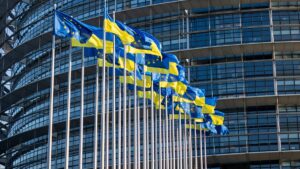
The European Parliament has supported the creation of a EUR 50 billion Ukraine Fund for the period 2024-2027 to support Ukraine and implement reforms for the country’s future accession to the European Union.
The relevant resolution was adopted on Tuesday in Strasbourg as part of the European Parliament’s plenary session. “536 deputies voted in favor of the resolution, 40 voted against, and 39 abstained. A total of 615 deputies took part in the voting.
“The Fund should combine recovery, reconstruction and modernization with the requirements and process of accession to the Union, linking financial support to reforms and investments with a view to joining (the EU),” the document says.
The document was authored by representatives of the Foreign Affairs Committee Michael Gahler (Germany) and the Budget Committee Eider Gardiasabal Rubial (Spain).
The resolution stipulates that the EU will support Ukraine in three areas. The first is financial support for the country to implement reforms and investments, as well as to maintain its macro-financial stability. The second is to mobilize investment and increase Ukraine’s access to finance. The third is to help Ukraine on its path to European integration.
The approved decision stipulates that 33% of the resources for Ukraine will be allocated in the form of grants, “with at least 20% earmarked for the restoration, reconstruction and modernization of Ukraine’s subnational authorities, such as regions, cities and local communities.” In addition, 20% of the fund’s investments will be directed to green initiatives, and 15% to small and medium-sized enterprises.
The resolution calls for the Ukrainian government to develop a Plan for Ukraine. This plan, as noted in the document, will be “a coherent, comprehensive and adequately balanced recovery and modernization effort that supports Ukraine’s economic, social and environmental recovery, sustainable development and progress towards accession to the Union”, in line with the goals and requirements of the EUR 50 billion Ukraine Fund.
The Ukraine Plan is expected to provide a framework for other donors to identify priority areas for funding the country’s recovery.
The activities of the Ukraine Fund are to be evaluated annually by the European Commission.
“For effective monitoring, Ukraine should report once a year on the progress of the implementation of measures. Such reports prepared by the government should be appropriately reflected in the Ukraine Plan. Relevant reporting requirements should be applied to the recipients of Union funding,” the resolution says.
The EP resolution also calls for the development of ways to “utilize frozen Russian assets.
The text emphasizes “the importance of working with international allies to achieve this goal.” “This includes ensuring progress on how to use frozen Russian assets to help rebuild Ukraine,” the document says.
The approval of the Fund for Ukraine by the European Parliament now paves the way for the EU Council to adopt an official regulation, which will enter into force after publication in the EU’s Official Journal.
Earlier, the European Commission’s proposal to establish the Ukraine Fund was approved by the EU Council at an extraordinary meeting on February 1, as Hungarian Prime Minister Viktor Orban blocked the decision at a scheduled meeting held last December.

The European Parliament has agreed to open an office in Kyiv at the request of Ukrainian President Volodymyr Zelenskyy.
According to the European publication Euractiv, this is stated in a document of the European Parliament’s bureau.
The decision, approved on Monday evening, is intended to facilitate relations with the Ukrainian parliament, in particular, to establish its contacts with the “relevant committees” of the European Parliament, as well as to facilitate administrative work.
The Bureau is the body of the European Parliament responsible for making administrative decisions on the internal functioning of the institution.
Reportedly, the European Parliament has a liaison office for each member state, which helps the parliament to establish links with them, for example, by communicating with stakeholders, organizing events and maintaining links with local media.
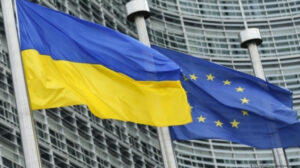
The European Parliament (EP) announced on Thursday that the Budget and Foreign Affairs Committees had “corrected and approved” a proposal to allocate EUR 50 billion for the restoration, reconstruction and modernization of Ukraine from 2024 to 2027.
The EP’s position was approved with 86 votes in favor, 6 against, and 2 abstentions.
The European Parliament’s communiqué points to the need for “urgent adoption (of the package) in accordance with the long-term review of the EU budget.”
“The proposed fund for Ukraine is part of the ongoing review of the EU’s long-term budget, which needs to be adjusted as it has been seriously depleted after the numerous crises that have occurred since 2021,” the EP said.
The package should also be integrated into next year’s annual budget, which will be negotiated in November, the document says.
One of the main demands of the MEPs is to use “assets of the Russian Federation or other legal or natural persons” of the Russian Federation for the restoration of Ukraine.
MEPs “strengthened the provisions on combating fraud, corruption, conflicts of interest and irregularities in the use of EU funds in Ukraine.”
It is stated that the full European Parliament will vote on this draft law at the plenary session of the European Parliament on October 16-19.
“Negotiations with member states can begin as soon as the Council (EU – IF-U) develops a common position,” the European Parliament said.
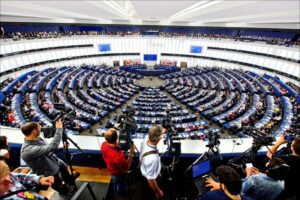
The European Parliament has voted in favor of revising the EU budget for 2021-2027, which provides for the creation of a special fund of EUR 50 billion to help Ukraine.
According to the press service of the European Parliament, the amendments on the mid-term review of the Multiannual Financial Framework for 2021-2027 were approved by 393 votes to 136 and 92 abstentions.
“Our goal was an ambitious but realistic proposal for the MFF review, and we managed to keep it focused but comprehensive. We aim to stabilize the situation in Ukraine with a new EUR 50 billion fund while supporting the EU economy,” said MEP Jan Olbricht.
In her turn, MEP Margarida Marquez noted that today the Parliament has identified the financial resources needed for the next four years.
“We urge the Rada to join us in the negotiations. By December 31, 2023, we want to have adequate funds to support Ukraine and continue to mitigate the social and economic consequences of the war, as well as rising inflation and living costs,” she said.
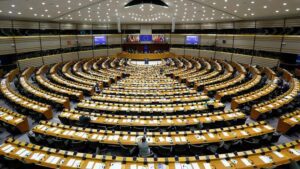
The European Parliament called on the leaders of the European Union, who will gather in Brussels on Thursday for a meeting of the European Council, to grant Ukraine the status of a candidate member of the European Union.
The corresponding resolution was voted on Thursday in Brussels in the framework of the plenary session of the European Parliament. “For” – 529, “against” – 45, with 14 abstentions.
“The European Parliament calls on the Heads of State and Government, who will meet within the Council of Europe on June 23 and 24, to immediately grant the status of EU candidate members to Ukraine and the Republic of Moldova, as well as to grant the same status to Georgia after its government fulfills the priorities indicated by the European Commission” , the resolution says.
At the same time, the European Parliament stressed that the heads of state and government “should fulfill their historical responsibility and give clear political signals” confirming their European perspective.
The resolution notes that in the context of “Russia’s brutal aggressive war against Ukraine, this step will be equated with a demonstration of leadership, determination and foresight.” MEPs point out that there is “no fast track for EU membership and that accession remains a merit-based and structured process that requires the fulfillment of EU membership criteria and depends on the effective implementation of reforms.”
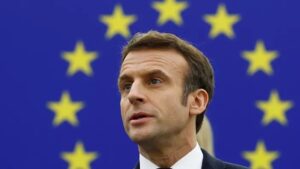
Verkhovna Rada Speaker Ruslan Stefanchuk will speak at the European Parliament and possibly meet with French President Emanuel Macron.
“First of all, in France, I will work on the parliamentary line…. A possible meeting with President Macron is being worked out, if the schedule allows,” Stefanchuk said on the air of the national telethon on Sunday.
According to Stefanchuk, in addition to Paris, he will visit Strasbourg and speak at the European Parliament.
“We will also work in Strasbourg, in the European Parliament. I will have a meeting with the leadership of the European Parliament and a speech in the European Parliament, and meetings with the main political groups of the European Parliament in order to enlist their support at this final stage,” Stefanchuk said.
He also did not rule out meetings with heads of other institutions of the European Union.
EUROPEAN PARLIAMENT, FRANCE, PRESIDENT, UKRAINIAN PARLIAMENT